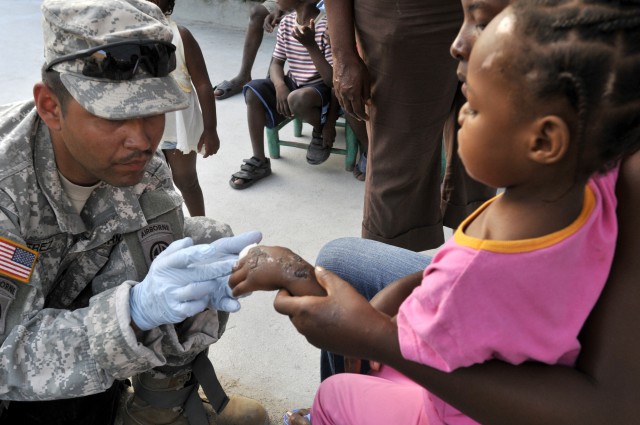FORT BELVOIR, Va. (July 15, 2010) -- The January earthquake that devastated the small Caribbean nation of Haiti initiated the immediate mobilization of Expeditionary Contracting Command contingency contracting officers.
Operation Unified Response was the first deployment for ECC personnel in response to an actual contingency and provided the command additional insight on future missions. The Expeditionary Contracting Command, headquartered at Fort Belvoir, Va., is a subordinate of the Army Contracting Command.
"Most of our overseas operations are exercise support and joint contracting command efforts for Operation Iraqi Freedom and Operation Enduring Freedom," said John Hess, ECC, principal assistant to the director, mission operations. "This is the first time the command has been involved in a disaster relief effort of this magnitude."
The first member of ECC to arrive on Haiti soil was Maj. Ralph Barnes, 410th Contracting Support Brigade, Fort Sam Houston, Texas. Haiti is in the 410th's area of operation thus the brigade became ECC's lead element for operations during the humanitarian operations.
Early in the mission, the 410th element, lead by Col. Quenton Rashid, ECC, integrated the team into the Combined Joint Task Force -Haiti's battle rhythm, leaning forward in planning and executing the broader aspects of operational contract support and became the lead for the JTF-Haiti contracting operations. The Joint Task Force - Haiti Regional Contracting Center developed contracts for latrine services, water, and support to current facilities, vehicles and other assets needed by military personnel supporting the relief effort.
"Contracting plays a huge role in these type operations and what the CJTF-Haiti can accomplish. Without the buses and these transportation assets, the CJTF can't accomplish their mission," said Lt. Col. Douglas Lowery, one of more than a dozen ECC Soldiers and civilians initially deployed to the region conducting contingency contracting operations.
According to Lowery, in addition to supporting the relief responders, the command's efforts assisted in supplying more than 15 million meals being delivered in a 10-day period to the Haitian population as well as the establishment of distribution points for families to receive 25- and 30-pound bags of rice, beans and cooking oils. Contracting efforts also helped turn dangerous and rudimentary shelters into areas with safer tents with water and meals being delivered on a routine basis.
The challenge for the contracting Soldiers was obtaining the supplies and services needed by those providing the direct assistance to the Haitian people.
"The lack or limitation of resources within country, and the speed in which contracting requirements came in for action and award," was a challenge," said Lt. Col. Lynda Royse, 410th CSB. Royse was the last ECC chief of the CJTF-Haiti RCC, leaving the country in the middle of June.
"As with any disaster type relief operation, there were immediate-needs type items," Royse said. "As they (CJTF-Haiti responders) were planning, they were coming in with requirements needing a quick turnaround, usually for the next day."
Blanket purchase agreements initially set up at the beginning of the mission made life a bit easier for Royse and her team.
"Because of the BPAs in place, we were able to better respond to the various types of requirements and immediate supply needs. Because of those, we were able to react to new requirements quickly because we were able to keep everything going," Royse said.
According to Brig. Gen. Joe Bass, commander, ECC, they deployed the right type of contracting support personnel early on to include quality assurance, legal, policy personnel and a Logistics Civil Augmentation Program, or LOGCAP planner; while establishing reach-back support from the 410th CSB and the U.S. Army Contracting Command Rock Island Contracting Center; and developing a contracting officer representative management plan.
"Overall, I am very pleased with what the command was able to achieve. We were able to provide the contingency contracting support needed by military first-responders that helped them achieve mission accomplished," Bass said.


Social Sharing